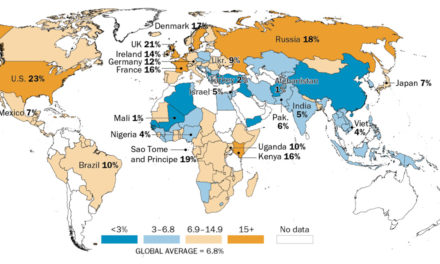China’s already deeply declining fertility rate dropped to a record low in 2022, according to official data provided by the Chinese government.
Demographers from the China Population and Development Research Centre – a government research institute – reported that China’s fertility rate last year fell to a staggeringly low 1.09, down from 1.15 in 2021.
This is below Japan’s 2022 fertility rate (1.26) and “only slightly higher than South Korea’s, which was estimated to be 0.8,” the Guardian reports. South Korea has the lowest fertility rate of any country in the world.
In their book Empty Planet: The Shock of Global Population Decline, social researcher Darrell Bricker and journalist John Ibbitson predict that China is headed towards an imminent population collapse due to declining fertility rates and the nation’s almost non-existent immigration policies.
One reason for China’s declining fertility rates is its long-standing one-child policy (enacted in 1979 and ended in 2016) which prevented the birth of an estimated 400 million people. Yesterday’s “solution” has become a major problem.
China, which currently is home to 1.4 billion people, could experience a population collapse “to between 612 and 643 million” by 2100. “Seven hundred million people could disappear from the face of the earth,” Bricker and Ibbitson write, adding, “China appears to be on the verge of a deliberate, controlled, massive collapse of its population. Nothing like this has ever occurred.”
Global Population Decline
The fertility rate measures the average number of children that women have over the course of their lives. The “replacement rate” is 2.1. This means a country’s women, as a group, need to average at least 2.1 children for each generation to simply replace itself.
When the fertility rate falls too far below 2.1 for too long, a nation’s population begins to shrink, sparking disastrous consequences. These include strained social safety net programs, falling economic growth and a lack of economic producers and consumers, among others.
Contrary to the assertions of many environmentalists and eco-friendly warriors, the world does not have too many people. It has too few.
One of the most notable “doomsayers” on population growth is Stanford University biologist Paul Ehrlich, author of the 1968 book The Population Bomb. Ehrlich predicted that the world population was ripe for collapse because of widespread starvation due to overpopulation.
Ehrlich was almost entirely wrong. Sometime this century, the world population will likely begin falling – but not due to starvation and overpopulation. It will result from contraception, abortion and urbanization.
In other words, our coming population collapse will not be due to involuntary and uncontrollable factors. Rather, it will be due to people deliberately choosing not to conceive and give birth to the next generation.
Bricker and Ibbison lay out this fact.
“The pill revolutionized sexuality,” they write, adding:
Women and men could have sex for fun, without fear of unwanted babies. If a woman did become pregnant, abortion became a legal option. … By the end of the 1970s, access to the pill and to a safe, legal abortion was common throughout the developed world. And fertility rates … plunge[d].
Additionally, they note that due to urbanization, friends and colleagues have generally replaced parents, siblings and other family members in many individuals’ social circles. And in general, only family members frequently encourage each other to have children. When this replacement occurs, the fertility rate declines as a result.
Summarizing our modern predicament, Bricker and Ibbitson forewarn:
The great defining event of the twenty-first century – one of the great defining events in human history – will occur in three decades give or take, when the global population starts to decline. Once that decline begins, it will never end.
We do not face the challenge of a population bomb but of a population bust – a relentless, generation-after-generation culling of the human herd. Nothing like this has ever happened before.
Takeaways for Christians
First, Christians should realize that we live in a profoundly anti-natal, individualized and self-oriented culture. If we’re not careful, we can adopt the same false mentality that many have towards family life.
Ehrlich once said that for women to have multiple children is like “throw[ing] as much of their garbage into their neighbor’s backyard as they want.”
Ehrlich, a figure frequently propped up by mainstream media outlets, compares babies – infants made in the image and likeness of God – to garbage. That’s an unsettling (to say the least) mindset that all too many moderns accept.
Christians, filled with the Holy Spirit and unashamed to proclaim a Gospel of Life should challenge and reject such narratives, and embrace the formation of new families and the creation of new life.
Second, Christians must remember that God was right from the very beginning. In the very first chapter of Genesis, God tells human beings to start families and have children.
“So God created man in his own image,
in the image of God he created him;
male and female he created them.
“And God blessed them. And God said to them, ‘Be fruitful and multiply and fill the earth and subdue it, and have dominion over the fish of the sea and over the birds of the heavens and over every living thing that moves on the earth’” (Genesis 1:27-28, ESV).
In looking to the future, Christians should start by looking at the beginning.
The future of humanity depends upon it.
Related articles and resources:
China Launches Largest Fertility Initiative in Human History
No, The World Does Not Have Too Many People. It Has Too Few.
Births in Japan Fall to Record Low Amid Catastrophic Population Decline, Foretelling World’s Future
Japanese Prime Minister Warns of Imminent Societal Collapse Due to Low Birth Rate
‘60 Minutes’ Platforms New Environmental Alarmism from Man Who’s Been Famously Wrong for 50+ Years
Photo from Shutterstock.






